We were to stay another day in Dodoma, to enable us to purchase food for the next couple of weeks and to have a little taste of the town. Ticha and Gele set off once more for the hospital, and we had breakfast at the guest house. Our expedition to the market saw us leaving the comparative calm behind the guest house’s beautiful purple poinsettia hedge and taking on the dusty, traffic filled streets. Rosie had told me about the beautiful materials so I was keen to see them, and Keith had the much more mundane search for a plug that would enable us to use our computer and recharge our phone as his priority.
At the crossroad there were a couple of restaurants and after that, a shop such as we know, with a closed door that shoppers enter. It was a computer shop, and we were able to purchase the plug and twenty CDs to give to the school at Farkwa. We weren’t sure of how they would be used, but Joy, Rosie’s mother and Keith’s sister, had mentioned that they would be needed so to get some.
Joy and Alan (Rosie’s parents) had stayed in Farkwa and seen the difficulty for families in being able to pay for the school fees and other requirements needed to attend secondary school. While a new secondary school going up to form 4 had been built, and many students passed the exam to be admitted to it, lots were not able to take up the opportunity. Joy went on to develop a scholarship sponsorship scheme with Australians paying for the education of specific needy students. For some, that includes board in Farkwa, because they are from surrounding villages too far away to walk from each day. We have sponsored one of the students, Adam, who is currently in form three. The cost is not much for us, but for Adam, our gift, which is the commitment to support the first four years of his secondary schooling, is the chance of an education and greater opportunities in life. To be perfectly honest, we were very happy to help, as we have been with the four World Vision sponsorships that we had provided for many, many years, but our very busy lives of full-time work, family, friends, grandchildren, clubs and the house and garden had not left us much time to be involved on a personal level. Suddenly we were to meet Adam, his brother Rashidi, who our son Aidan and family sponsor, and their mother and family. Adam would no longer be someone unknown for whom we wrote cheques. We hoped that the soccer ball and drafts that we had for the boys would suit them. We even felt a little nervous at meeting them.
Joy works tirelessly in Australia, drumming up more sponsors, although friends of friends of friends have opened up a generous and responsive avenue of support. She and Rosie, in consultation with Mr Chalala, the Head Master at the school, have set up a table of costs and ways to establish accountability in the transfer and spending of monies that scrupulously ensures that the funds provided have no administrative drain and that every cent is spent on the students. It is a good thing that Joy retired just in time to take up this second vocation!
Joy had purchased a laptop computer for the school, to assist with scholarship administration and to provide the opportunity for the teachers and students to gain some experience with a computer. She had also organised funds for a solar panel to be installed on the school roof to power the computer, and one of the teachers had been to town to purchase the items needed. We were visiting at the same time as Rosie simply to have the experience of living in a Tanzanian village and the opportunity to get to know Ticha’s family. However, it was timely since the computer would need to be introduced to the teachers, and Keith has lots of experience and expertise in teacher training with computers. I was to help with one of the English teachers who had been sent a digital camera from Joy. The idea was that at first we would find our feet in the new climate for a few days and then we would need to feel our way with the teachers, hoping that they would welcome us into the school. We were glad that there would be a helpful role for us because we had not felt so comfortable with the idea of being voyeur tourists or encumbrance visitors for so long a time.
All this is ahead of us, and a big unknown, and a little daunting too. Today we were just happy strolling about the streets of Dodoma, where the shops look a bit like a shanty town and have no fronts as we know them, and where there were so many people just gathered in groups talking or waiting for someone to look at their goods.
 Sebi wanted to play with some little cars while I was minding him, and after asking Rosie, we bought one each for him and Jarvah to help entertain them back at the guest house. Sebi was reluctant to walk at some stages so Keith carried him high on his shoulders.
Sebi wanted to play with some little cars while I was minding him, and after asking Rosie, we bought one each for him and Jarvah to help entertain them back at the guest house. Sebi was reluctant to walk at some stages so Keith carried him high on his shoulders.
We were pleasantly surprised that no-one hassled us to buy things, and Rosie and I were able to go in and out of fabric stalls to our hearts’ content – but how to choose? I did settle on one fabric but only moments after purchasing it, a woman walked by in an outfit made in a material that I liked a lot better. The fashions here are brightly coloured and of the most marvellous fabrics and in lots of different styles. Rosie says that there is a tailor in Farkwa who could make me something – I guess on a treadle sewing machine like the ones we have seen busily working here in Dodoma. I immediately forget my agreement to just have the most basic of clothes, having given away my extras in Barcelona.
Rosie says that there is a tailor in Farkwa who could make me something – I guess on a treadle sewing machine like the ones we have seen busily working here in Dodoma. I immediately forget my agreement to just have the most basic of clothes, having given away my extras in Barcelona.
We all returned for a late morning siesta and some typing. When the little boys woke, it was about two o’clock and we all went to the corner restaurant for lunch. We placed our orders. A couple of people acting as human display shelves stopped at our table to see if we wanted to buy some watches, torches, irons, other electrical goods, or something from a small range of shoes. Apparently it is possible to do all your shopping while sitting down sipping tea.
A blind man with a white stick tap tapped his way through, with his hand out towards us. Keith gave him some money. A woman, fairly ragged and dirty, approached us, holding out her hand. It is interesting that our reaction was to clasp her hand and greet her, with the social good behaviour instinct knocking out any critical thinking that might have asked about her health or cleanliness status. She sat down and, still clasping my hand, handed us a sheet of paper with writing on it in Swahili. Rosie told us that she is a nuisance, a beggar woman who sits down at your table until you give her some money, and that the paper said that she was ill. She still had my hand in hers.
‘What kind of illness?’ I asked.
‘Who knows? Maybe none, maybe all kinds,’ Rosie replied. She advised against encouraging her by giving her any money but I am glad that Keith handed her some and she departed. This form of begging in a place where you are obviously able to pay for food and where you are a captive audience is much more confronting that when people in the street have a cup out, and ask for money.
The meals arrive for the boys and Rosie, but ours had not appeared after about 40 minutes. Our waitress was not to be found. Maybe asking for vegetables, beans, chips and rice, all on the menu, but no meat, was too hard. Another waiter said that they had run out of rice so that was why we were not served. It was a pity they had not told us. Nevertheless, it meant that our new waiter gave us ugali instead, a kind of edible playdough-like stuff that you shape into a little bowl to scoop up the other bits of food. A new experience and the ugali tasted bland but fine. I hoped that my right hand, the one acceptable for eating with in Tanzania, and the one that had been extended to the ill woman, was not filling me with diseases as we ate!
We arrived back at the guest house much later than three o’clock, the time that we were to meet with Ticha’s sister, Gracia, to go to the market. Luckily she was running late herself, and there seemed to be no stress from not knowing when she would arrive or when the shopping would be done. Everyone seems to make many mobile phone calls; many more than we ever make to organise and update arrangements, but that may be regular for Rosie and young people and not something peculiar to here.
Rosie had felt that it would be best if Gracia was in charge of the shopping since, although she speaks Swahili, there is a different approach to her as a white foreigner than to a local. Gracia arrived with her friend Katerina and Katerina’s small son, Goody. They were so friendly and had the most beautiful smiles. Gracia looked nothing like Ticha and I would never have guessed that she was his sister.
The excursion to the food market was fascinating. There were lots and lots of stalls, with many selling the same things – lots of fruits and vegetables, with the peas having been shelled into long plastic packets, grains, pulses and flours.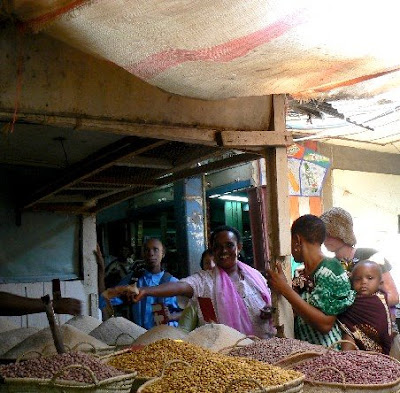
 The paths between the stalls were narrow and it was a bit of a nightmare keeping track of Sebi, who was putting his hands into baskets of food and wouldn’t stay near Rosie. Rosie was really worried about him being taken off by someone. We bought two large woven baskets to put the purchases in, and I thought my arm would drop off as I shared carrying it with Gracia and ever more was added to the load. A boy of about eleven had been following us all around the market, in case we would have liked to pay him to carry our purchases, a bit like a human supermarket trolley. Keith carried our twenty kilograms of rice when we picked it up at the end of the session, three kilograms of which Rosie said would be used each evening to feed the family. A mosquito net and a couple of buckets later, we hired a boy with a barrow to push our purchases back to the guest house.
The paths between the stalls were narrow and it was a bit of a nightmare keeping track of Sebi, who was putting his hands into baskets of food and wouldn’t stay near Rosie. Rosie was really worried about him being taken off by someone. We bought two large woven baskets to put the purchases in, and I thought my arm would drop off as I shared carrying it with Gracia and ever more was added to the load. A boy of about eleven had been following us all around the market, in case we would have liked to pay him to carry our purchases, a bit like a human supermarket trolley. Keith carried our twenty kilograms of rice when we picked it up at the end of the session, three kilograms of which Rosie said would be used each evening to feed the family. A mosquito net and a couple of buckets later, we hired a boy with a barrow to push our purchases back to the guest house.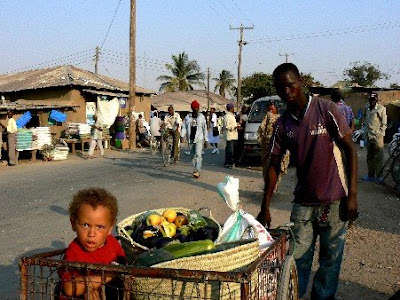

 It is easy to forget how time consuming young children are, and particularly in a place where they can not have much freedom to run about. The guest house had a small area where they could play but the exit to the road had to be constantly guarded by one of the family so that they would not go out, and so that when Sebi did, he would be brought back. One of the little cars that we had bought was already a bit broken, just from playing with them in the room.
It is easy to forget how time consuming young children are, and particularly in a place where they can not have much freedom to run about. The guest house had a small area where they could play but the exit to the road had to be constantly guarded by one of the family so that they would not go out, and so that when Sebi did, he would be brought back. One of the little cars that we had bought was already a bit broken, just from playing with them in the room.
We met Ticha for a drink opposite our lunch time restaurant, at some tables set up on a dusty corner. He had the bad news that Gele’s wrist required five days of treatments and injections, so Ticha and Gele would have to stay on in Dodoma unless another member of the family could come to help Gele. I went back to the guest house to change into a less mosquito-accessible outfit when evening fell and there was lots of buzzing around us. Tea at a café on a wide made road was ‘chipsy mayai’ for us, an omelette with chips embedded in it and quite delicious. The café had a little hand basin in it for patrons to wash their hands before and after the meal, and although we had knives and forks, some of the other dishes were for people to share using their fingers.
Rosie, Sebi, Keith and I left before the others had finished because Sebi had had it and was crying and generally disrupting the café. We were back in the Southern hemisphere so we had a little look at the stars on the way home, before packing up for what was to me, the main part of our trip to Africa. In the morning we would set off for Farkwa.
At the crossroad there were a couple of restaurants and after that, a shop such as we know, with a closed door that shoppers enter. It was a computer shop, and we were able to purchase the plug and twenty CDs to give to the school at Farkwa. We weren’t sure of how they would be used, but Joy, Rosie’s mother and Keith’s sister, had mentioned that they would be needed so to get some.
Joy and Alan (Rosie’s parents) had stayed in Farkwa and seen the difficulty for families in being able to pay for the school fees and other requirements needed to attend secondary school. While a new secondary school going up to form 4 had been built, and many students passed the exam to be admitted to it, lots were not able to take up the opportunity. Joy went on to develop a scholarship sponsorship scheme with Australians paying for the education of specific needy students. For some, that includes board in Farkwa, because they are from surrounding villages too far away to walk from each day. We have sponsored one of the students, Adam, who is currently in form three. The cost is not much for us, but for Adam, our gift, which is the commitment to support the first four years of his secondary schooling, is the chance of an education and greater opportunities in life. To be perfectly honest, we were very happy to help, as we have been with the four World Vision sponsorships that we had provided for many, many years, but our very busy lives of full-time work, family, friends, grandchildren, clubs and the house and garden had not left us much time to be involved on a personal level. Suddenly we were to meet Adam, his brother Rashidi, who our son Aidan and family sponsor, and their mother and family. Adam would no longer be someone unknown for whom we wrote cheques. We hoped that the soccer ball and drafts that we had for the boys would suit them. We even felt a little nervous at meeting them.
Joy works tirelessly in Australia, drumming up more sponsors, although friends of friends of friends have opened up a generous and responsive avenue of support. She and Rosie, in consultation with Mr Chalala, the Head Master at the school, have set up a table of costs and ways to establish accountability in the transfer and spending of monies that scrupulously ensures that the funds provided have no administrative drain and that every cent is spent on the students. It is a good thing that Joy retired just in time to take up this second vocation!
Joy had purchased a laptop computer for the school, to assist with scholarship administration and to provide the opportunity for the teachers and students to gain some experience with a computer. She had also organised funds for a solar panel to be installed on the school roof to power the computer, and one of the teachers had been to town to purchase the items needed. We were visiting at the same time as Rosie simply to have the experience of living in a Tanzanian village and the opportunity to get to know Ticha’s family. However, it was timely since the computer would need to be introduced to the teachers, and Keith has lots of experience and expertise in teacher training with computers. I was to help with one of the English teachers who had been sent a digital camera from Joy. The idea was that at first we would find our feet in the new climate for a few days and then we would need to feel our way with the teachers, hoping that they would welcome us into the school. We were glad that there would be a helpful role for us because we had not felt so comfortable with the idea of being voyeur tourists or encumbrance visitors for so long a time.
All this is ahead of us, and a big unknown, and a little daunting too. Today we were just happy strolling about the streets of Dodoma, where the shops look a bit like a shanty town and have no fronts as we know them, and where there were so many people just gathered in groups talking or waiting for someone to look at their goods.

 Sebi wanted to play with some little cars while I was minding him, and after asking Rosie, we bought one each for him and Jarvah to help entertain them back at the guest house. Sebi was reluctant to walk at some stages so Keith carried him high on his shoulders.
Sebi wanted to play with some little cars while I was minding him, and after asking Rosie, we bought one each for him and Jarvah to help entertain them back at the guest house. Sebi was reluctant to walk at some stages so Keith carried him high on his shoulders.We were pleasantly surprised that no-one hassled us to buy things, and Rosie and I were able to go in and out of fabric stalls to our hearts’ content – but how to choose? I did settle on one fabric but only moments after purchasing it, a woman walked by in an outfit made in a material that I liked a lot better. The fashions here are brightly coloured and of the most marvellous fabrics and in lots of different styles.
 Rosie says that there is a tailor in Farkwa who could make me something – I guess on a treadle sewing machine like the ones we have seen busily working here in Dodoma. I immediately forget my agreement to just have the most basic of clothes, having given away my extras in Barcelona.
Rosie says that there is a tailor in Farkwa who could make me something – I guess on a treadle sewing machine like the ones we have seen busily working here in Dodoma. I immediately forget my agreement to just have the most basic of clothes, having given away my extras in Barcelona.We all returned for a late morning siesta and some typing. When the little boys woke, it was about two o’clock and we all went to the corner restaurant for lunch. We placed our orders. A couple of people acting as human display shelves stopped at our table to see if we wanted to buy some watches, torches, irons, other electrical goods, or something from a small range of shoes. Apparently it is possible to do all your shopping while sitting down sipping tea.
A blind man with a white stick tap tapped his way through, with his hand out towards us. Keith gave him some money. A woman, fairly ragged and dirty, approached us, holding out her hand. It is interesting that our reaction was to clasp her hand and greet her, with the social good behaviour instinct knocking out any critical thinking that might have asked about her health or cleanliness status. She sat down and, still clasping my hand, handed us a sheet of paper with writing on it in Swahili. Rosie told us that she is a nuisance, a beggar woman who sits down at your table until you give her some money, and that the paper said that she was ill. She still had my hand in hers.
‘What kind of illness?’ I asked.
‘Who knows? Maybe none, maybe all kinds,’ Rosie replied. She advised against encouraging her by giving her any money but I am glad that Keith handed her some and she departed. This form of begging in a place where you are obviously able to pay for food and where you are a captive audience is much more confronting that when people in the street have a cup out, and ask for money.
The meals arrive for the boys and Rosie, but ours had not appeared after about 40 minutes. Our waitress was not to be found. Maybe asking for vegetables, beans, chips and rice, all on the menu, but no meat, was too hard. Another waiter said that they had run out of rice so that was why we were not served. It was a pity they had not told us. Nevertheless, it meant that our new waiter gave us ugali instead, a kind of edible playdough-like stuff that you shape into a little bowl to scoop up the other bits of food. A new experience and the ugali tasted bland but fine. I hoped that my right hand, the one acceptable for eating with in Tanzania, and the one that had been extended to the ill woman, was not filling me with diseases as we ate!
We arrived back at the guest house much later than three o’clock, the time that we were to meet with Ticha’s sister, Gracia, to go to the market. Luckily she was running late herself, and there seemed to be no stress from not knowing when she would arrive or when the shopping would be done. Everyone seems to make many mobile phone calls; many more than we ever make to organise and update arrangements, but that may be regular for Rosie and young people and not something peculiar to here.
Rosie had felt that it would be best if Gracia was in charge of the shopping since, although she speaks Swahili, there is a different approach to her as a white foreigner than to a local. Gracia arrived with her friend Katerina and Katerina’s small son, Goody. They were so friendly and had the most beautiful smiles. Gracia looked nothing like Ticha and I would never have guessed that she was his sister.
The excursion to the food market was fascinating. There were lots and lots of stalls, with many selling the same things – lots of fruits and vegetables, with the peas having been shelled into long plastic packets, grains, pulses and flours.

 The paths between the stalls were narrow and it was a bit of a nightmare keeping track of Sebi, who was putting his hands into baskets of food and wouldn’t stay near Rosie. Rosie was really worried about him being taken off by someone. We bought two large woven baskets to put the purchases in, and I thought my arm would drop off as I shared carrying it with Gracia and ever more was added to the load. A boy of about eleven had been following us all around the market, in case we would have liked to pay him to carry our purchases, a bit like a human supermarket trolley. Keith carried our twenty kilograms of rice when we picked it up at the end of the session, three kilograms of which Rosie said would be used each evening to feed the family. A mosquito net and a couple of buckets later, we hired a boy with a barrow to push our purchases back to the guest house.
The paths between the stalls were narrow and it was a bit of a nightmare keeping track of Sebi, who was putting his hands into baskets of food and wouldn’t stay near Rosie. Rosie was really worried about him being taken off by someone. We bought two large woven baskets to put the purchases in, and I thought my arm would drop off as I shared carrying it with Gracia and ever more was added to the load. A boy of about eleven had been following us all around the market, in case we would have liked to pay him to carry our purchases, a bit like a human supermarket trolley. Keith carried our twenty kilograms of rice when we picked it up at the end of the session, three kilograms of which Rosie said would be used each evening to feed the family. A mosquito net and a couple of buckets later, we hired a boy with a barrow to push our purchases back to the guest house.

 It is easy to forget how time consuming young children are, and particularly in a place where they can not have much freedom to run about. The guest house had a small area where they could play but the exit to the road had to be constantly guarded by one of the family so that they would not go out, and so that when Sebi did, he would be brought back. One of the little cars that we had bought was already a bit broken, just from playing with them in the room.
It is easy to forget how time consuming young children are, and particularly in a place where they can not have much freedom to run about. The guest house had a small area where they could play but the exit to the road had to be constantly guarded by one of the family so that they would not go out, and so that when Sebi did, he would be brought back. One of the little cars that we had bought was already a bit broken, just from playing with them in the room.We met Ticha for a drink opposite our lunch time restaurant, at some tables set up on a dusty corner. He had the bad news that Gele’s wrist required five days of treatments and injections, so Ticha and Gele would have to stay on in Dodoma unless another member of the family could come to help Gele. I went back to the guest house to change into a less mosquito-accessible outfit when evening fell and there was lots of buzzing around us. Tea at a café on a wide made road was ‘chipsy mayai’ for us, an omelette with chips embedded in it and quite delicious. The café had a little hand basin in it for patrons to wash their hands before and after the meal, and although we had knives and forks, some of the other dishes were for people to share using their fingers.
Rosie, Sebi, Keith and I left before the others had finished because Sebi had had it and was crying and generally disrupting the café. We were back in the Southern hemisphere so we had a little look at the stars on the way home, before packing up for what was to me, the main part of our trip to Africa. In the morning we would set off for Farkwa.
Below: Street scenes around Dodoma, capital of Tanzania


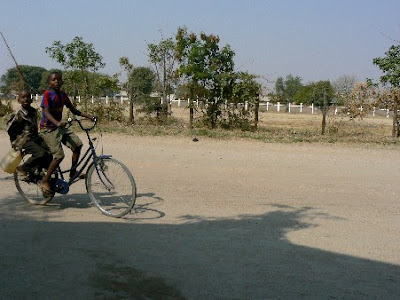

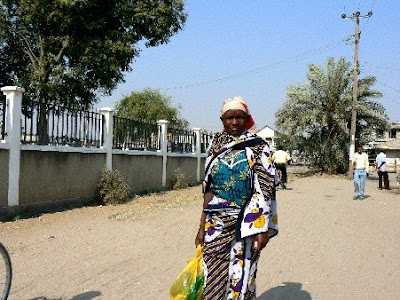


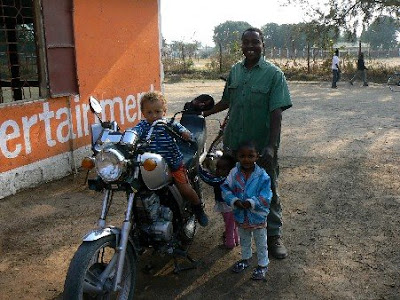








No comments:
Post a Comment